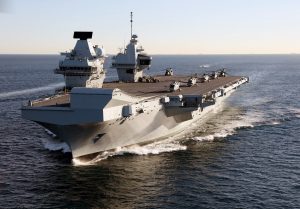Later this year, the HMS Queen Elizabeth, the new Royal Navy aircraft carrier, will undertake its maiden deployment to the Asia-Pacific region. It will arrive as the flagship of a Carrier Strike Group, CSG21, that includes an air wing of U.S. Marine F-35s, nuclear submarines, and a number of U.S. and U.K. surface escort ships. The group is a bold statement of intent for a national defense policy that is tilting back toward the Indo-Pacific region after decades of contraction and focus on its NATO responsibilities to the North Atlantic. The deployment marks the Royal Navy’s return in force to east of the Suez Canal and reverses a government policy followed since 1967 that sustained operations in the Indo-Pacific were beyond the U.K.’s economic means or, with the loss of the empire, its strategic interests.
This deployment and its choice of operating area is significant for a number of reasons. Reaction to its announcement has focused on the alarm bells it will raise with China. It does show a new determination on the part of the U.K. government to expand the maritime influence of the Royal Navy with new and improved capability and to extend its reach to unfamiliar (at least in recent times) operational areas.
But why?
Following Brexit and COVID-19, the U.K. faces great economic and political uncertainty. Many would challenge not only the premise of increased defense expenditures but why the government would also risk raising tensions further with one of the same countries it is counting on economically — China.
Certainly, the feeling that China needs to stop throwing its weight around will be a sentiment shared by many in the corridors of the Foreign Office and Ministry of Defense. There has been frustration over the inability to respond forcefully against pro-democracy crackdowns in Hong Kong or meet popular concern over human rights abuses against the Uyghur population in Xinjiang Province. Suspicion about the activities of Chinese tech companies has also caused political hand-wringing over how to respond. Chinese hegemony in the South China Sea needs to be checked and given that many of the Pacific Rim nations are heavily invested and dependent on their huge neighbor efforts at containment have had to come from the U.S. alone.
Which brings us to the new U.S. president. Many have wondered whether Biden may be less amenable than his predecessors to his British allies. A number of commentators have predicted a pivot by Biden to continental Europe with a new axis forming between Washington, Berlin, and Paris, leaving London somewhat on the sidelines. In truth, such ideas misunderstand the depth of U.S./U.K. defense and intelligence integration, which successfully transcends the terms of presidents or prime ministers. Nevertheless, the opportunity to affirm the U.K.’s relationship with the U.S. will do much to silence those predicting the death of the “special relationship.”
While the British maritime capability in the region will be small compared to its U.S. counterparts, it will be warmly received in senior U.S. diplomatic and military circles as the credible and reliable addition of a permanent U.N. Security Council member to assist in the strategic wrestle with China. HMS Queen Elizabeth and her sister, the HMS Prince of Wales, are world-class vessels, eclipsing the smaller single French carrier and close to the capabilities of the U.S. supercarriers. It is likely the carrier group will conduct freedom of navigation passages that will certainly bring a response of some form from Beijing. Part of the intention of such maneuvers will be to remind the Chinese navy that its own carrier force plans, while ambitious, still lag behind the West in technology and capability.
But if the deployment were about Britain re-engaging with its strategic role alone, it probably would not happen. There is an aspect to the mission that may be of at least equal importance to the containment of a strategic rival to Western interests.
The U.K. needs new business partners.
Since the decision to exit the European Union, the U.K. has been on the hunt for new trading relationships with which it can rebalance its economy following the expected downturn in its trade with the European super bloc. Boris Johnson’s government looks to the fast-growing and relatively underdeveloped economies of Southeast Asia to turbocharge economic growth and prove the country’s decision to break free of the collective trading arrangements were correct. As its first major prize it would view membership in the Comprehensive and Progressive Agreement for Trans-Pacific Partnership (CPTPP) as a major endorsement demonstrating that an agile approach to global trade and services not only will compensate for lost EU trade but will accelerate Britain’s economic prosperity on the back of Asian growth.
Achieving this goal will require strategic engagement with the region, demonstrating Britain’s credentials as a reliable security and trade partner. While Britain has never disengaged from Asia and has always deployed considerable “soft power” in the region, its priorities will need to shift and be seen to shift. Much diplomatic groundwork has been undertaken for this “tilt” to the Indo-Pacific region and this major deployment of military muscle is a major step in that process.
As the state-of-the-art 65,000-ton warship and its entourage departs Portsmouth later this year, it will take with it a number of burdens and challenges: confronting an increasingly hostile Beijing, demonstrating its reliability and worth as an ally to Washington, reassuring with diplomatic charm the capitals of the Pacific Rim, and spearheading the U.K.’s economic regeneration with a visible display of technology and intent.
There is a great deal at stake for the British nation at stake, which is why this carrier strike group deployment is about more than “showing the flag.”
James Maclaren is a former U.K. army officer, freelance journalist and author focusing on defense and security. He is based in London and the Far East and writes for a number of periodicals and specialist magazines.
































